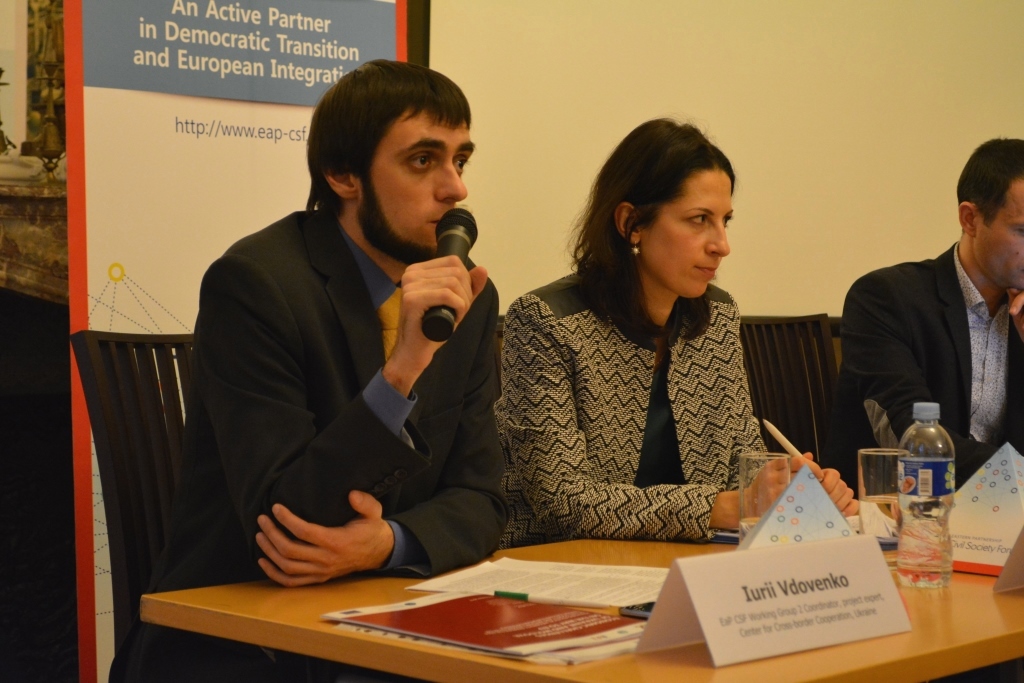|
IN THE SPOTLIGHT |
Eastern Partnership Civil Society Forum
|
|
EaP CSF Regranted Projects on DCFTA Implementation Presented at the Permanent Representation of Lithuania to the EU2 February 2016
The Eastern Partnership Civil Society Forum and the Eastern Europe Studies Centre from Lithuania held on 27 January the panel discussion: “DCFTA Implementation in Georgia, Moldova and Ukraine: Overcoming Challenges and Embracing Opportunities”. The event took place at the Permanent Representation of Lithuania to the European Union and was opened by H.E. Jovita Neliupšiené, Lithuanian Permanent Representative to the EU. Underlining that “DCFTA is much more than about trade, it is about moving the EU borders further East”, H.E. Neliupšiené highlighted the experience of Lithuania from 1994 to 2015 similar to that of the Eastern Partnership countries. For instance, she mentioned the challenges of tolerance towards corruption and institutions lagging behind.
Two analytical studies focused on the DCFTA implementation in Georgia, Moldova and Ukraine were further presented by the contributing experts Dovilé Šukyté, Iurii Vdovenko and Sergiu Mihailov. Dovilé Šukyté from the Eastern Europe Studies Centre presented the research “Economic Challenges of Ukraine and Moldova on the Way to EU” that was conducted on the basis of interviews with a number of officials from Central and Eastern European (CEE) countries. She noted that strong institutional capacity and involvement of civil society as an equal partner are important prerequisites for the success of reforms ensuing from DCFTA implementation. However, civil society needs to be more constructive and less dependent on forein grants. Iurii Vdovenko, Coordinator of the EaP CSF WG2 from Center for Cross-border Cooperation, explained that similar challenges exist in Ukraine and Moldova related to the dependence on international support.
The second study “DCFTAs: Challenges and Opportunities for SMEs” was presented by Sergiu Mihailov from Pro Cooperare Regionala (Moldova), who explained the particularities of DCFTA implementation impact on Georgian, Moldovan and Ukrainian small and medium businesses operating in agriculture sector and rural areas. He named the market access, border procedures, access to finance, reduced institutional capacity as the most prominent challenges for SMEs in these countries. MEP Petras Auštrevičius focused his remarks on the developments that serve as good reasons for optimism, such as the progress in visa liberalization for Georgia and Ukraine, and concluded that many other developments in this sense are still to come in 2016. Arnoldas Pranckevičius, Adviser for External Policies to the President of the European Parliament noted that EaP initiative is mostly driven by the European Commission and that EU member states should feel more ownership about the EaP project. He mentioned that the recently-adopted EP resolution on AAs and DCFTAs with Georgia, Moldova and Ukraine is a realistic assessment of the current situation and praised the progress of Ukraine in implementing reforms, however noting that the weight of further reforms is still "larger than Ukraine itself". Study "Economic Challenges of Ukraine and Moldova on the Way to EU” The projects are supported by the EaP CSF re-granting mechanism
|
Project funded by the European Union
![]()











